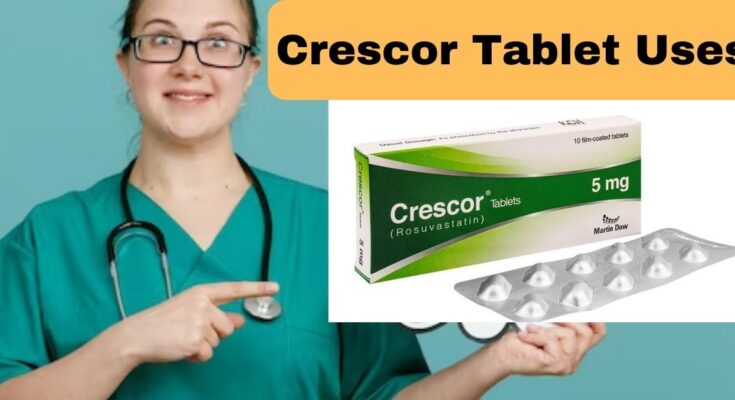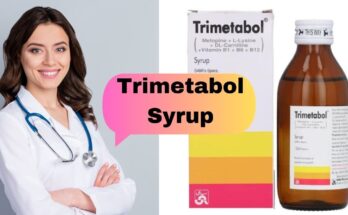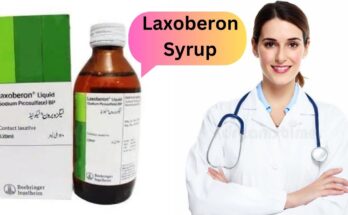Introduction
Crescor Tablet Uses Side Effects. Crescor, also known by its generic name Rosuvastatin, plays a crucial role in managing cholesterol levels. Here’s what you need to know:
- What Is Crescor?
- Crescor is a medication commonly prescribed to patients with high cholesterol.
- It falls under the category of statins, a group of drugs specifically designed to regulate cholesterol.
- Primary Purpose
- The primary purpose of Crescor is to lower cholesterol levels in the blood.
- By doing so, it helps reduce the risk of cardiovascular diseases, including heart attacks and strokes.
- How Crescor Fits In
- Crescor works by inhibiting an enzyme in the liver called HMG-CoA reductase.
- This enzyme is responsible for producing cholesterol in the body.
- By blocking HMG-CoA reductase, Crescor effectively reduces the production of LDL (low-density lipoprotein) cholesterol, commonly known as “bad” cholesterol.
- Additionally, it may increase the levels of HDL (high-density lipoprotein) cholesterol, which is considered “good” cholesterol.
Uses of Crescor (Rosuvastatin)
- Cholesterol Management:
- Crescor is primarily prescribed for lowering cholesterol levels in individuals with hypercholesterolemia.
- It specifically targets LDL (low-density lipoprotein) cholesterol, which is often referred to as “bad” cholesterol.
- By reducing LDL cholesterol, Crescor helps prevent the buildup of plaque in arteries, which can lead to blockages and cardiovascular diseases.
- Role in Cardiovascular Health:
- Crescor plays a crucial role in maintaining overall heart health.
- It not only lowers LDL cholesterol but also has the potential to increase HDL (high-density lipoprotein) cholesterol, known as “good” cholesterol.
- Higher HDL levels are associated with a reduced risk of heart attacks and strokes.
- Preventing Arterial Blockages:
- Crescor’s ability to decrease cholesterol levels contributes to preventing the narrowing of blood vessels due to plaque accumulation.
- By keeping arteries clear, it reduces the risk of heart-related complications.

Mechanism of Action
- Enzyme Inhibition:
- Rosuvastatin, the active ingredient in Crescor, works by inhibiting an enzyme called HMG-CoA reductase.
- HMG-CoA reductase is primarily responsible for producing cholesterol in the liver.
- By blocking this enzyme, Rosuvastatin reduces the synthesis of cholesterol within the body.
- LDL Cholesterol Reduction:
- Elevated levels of LDL (low-density lipoprotein) cholesterol contribute to the formation of arterial plaques.
- Rosuvastatin specifically targets LDL cholesterol, effectively lowering its concentration in the bloodstream.
- As a result, it helps prevent the buildup of plaque, reducing the risk of heart disease and stroke.
- HDL Cholesterol Elevation:
- In addition to lowering LDL cholesterol, Rosuvastatin may also increase HDL (high-density lipoprotein) cholesterol.
- HDL cholesterol is considered “good” because it helps remove excess cholesterol from the blood vessels.
- By raising HDL levels, Rosuvastatin further promotes cardiovascular health.
Common Side Effects of Crescor
- Headache:
- Some individuals may experience mild headaches while taking Crescor.
- These headaches are usually temporary and tend to resolve on their own.
- Abdominal Pain:
- Abdominal discomfort or pain can occur as a side effect.
- It’s essential to monitor the severity and duration of abdominal symptoms.
- Muscle Pain:
- Crescor may cause muscle pain or discomfort.
- If you notice any unusual muscle sensations, consult your doctor promptly.
- Nausea:
- Nausea is another common side effect.
- Taking Crescor with food may help alleviate this symptom.
- Weakness:
- Some individuals may feel weak or fatigued while on Crescor.
- Adequate rest and hydration can help manage this effect.
Serious Side Effects of Crescor
- Severe Muscle Problems (Myopathy):
- Myopathy refers to a condition where muscle fibers are damaged or weakened.
- Crescor can rarely cause myopathy, leading to rhabdomyolysis—a severe breakdown of muscle tissue.
- Symptoms may include muscle pain, weakness, and dark urine.
- If you experience any of these signs, seek medical attention promptly.
- Liver Problems:
- Crescor can affect liver function.
- Regular monitoring of liver enzymes (such as ALT and AST) is essential during treatment.
- Increased liver enzymes may indicate potential liver damage.
- If you notice symptoms like jaundice, abdominal pain, or unusual fatigue, consult your doctor immediately.
Conclusion
In summary, Crescor (Rosuvastatin) is a valuable ally in managing cholesterol levels and promoting heart health. Here’s what we’ve learned:
- Cholesterol Management Benefits:
- Crescor effectively lowers LDL (bad) cholesterol, reducing the risk of arterial blockages.
- It may also raise HDL (good) cholesterol levels, further safeguarding cardiovascular health.
- Patient Responsibility:
- If you’re prescribed Crescor, follow your doctor’s instructions diligently.
- Report any adverse effects promptly, whether mild or serious.
- Regular check-ups and liver enzyme monitoring are essential.
Remember that personalized medical advice is crucial, so consult your healthcare provider for individualized recommendations. Take care of your heart, and stay informed!




